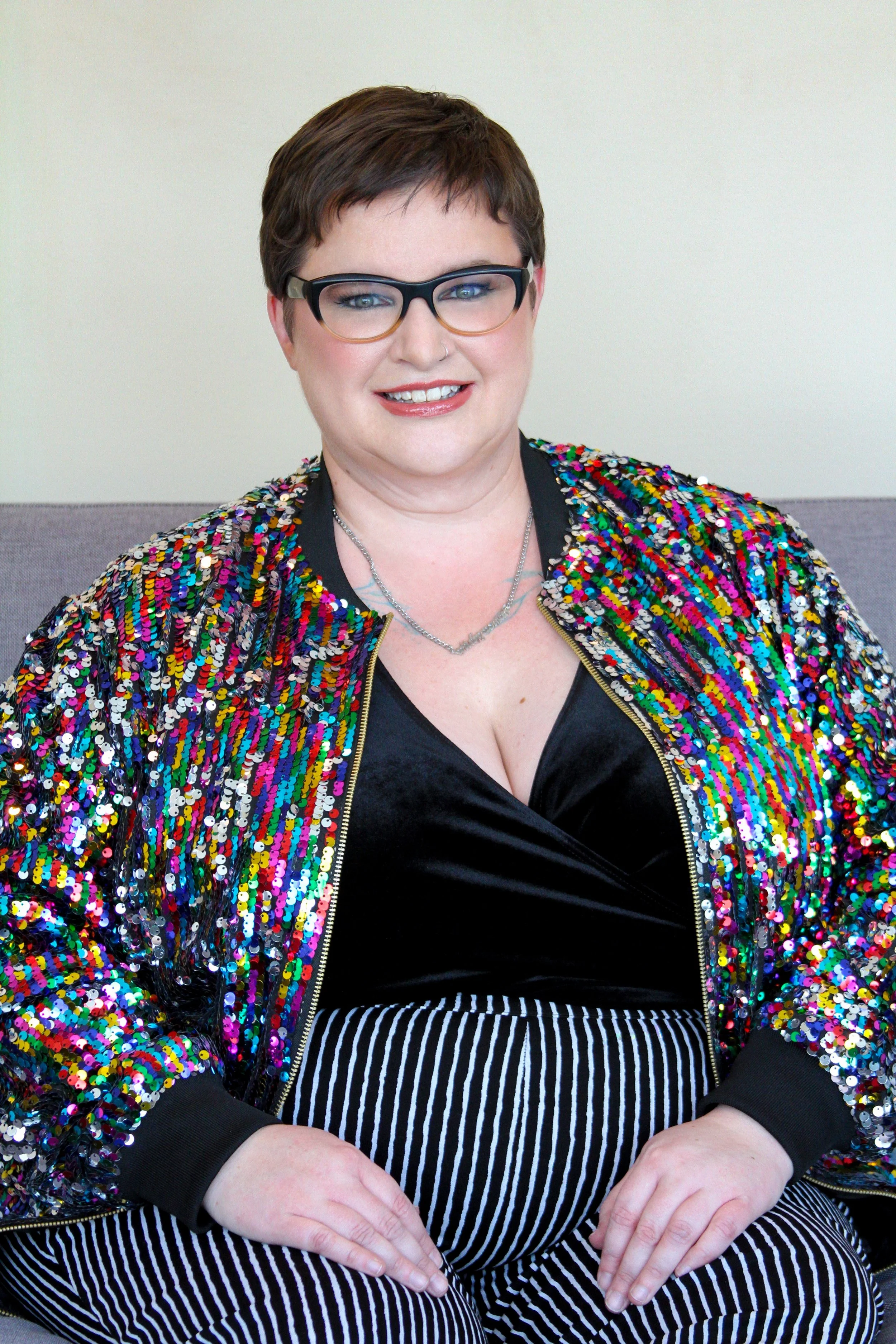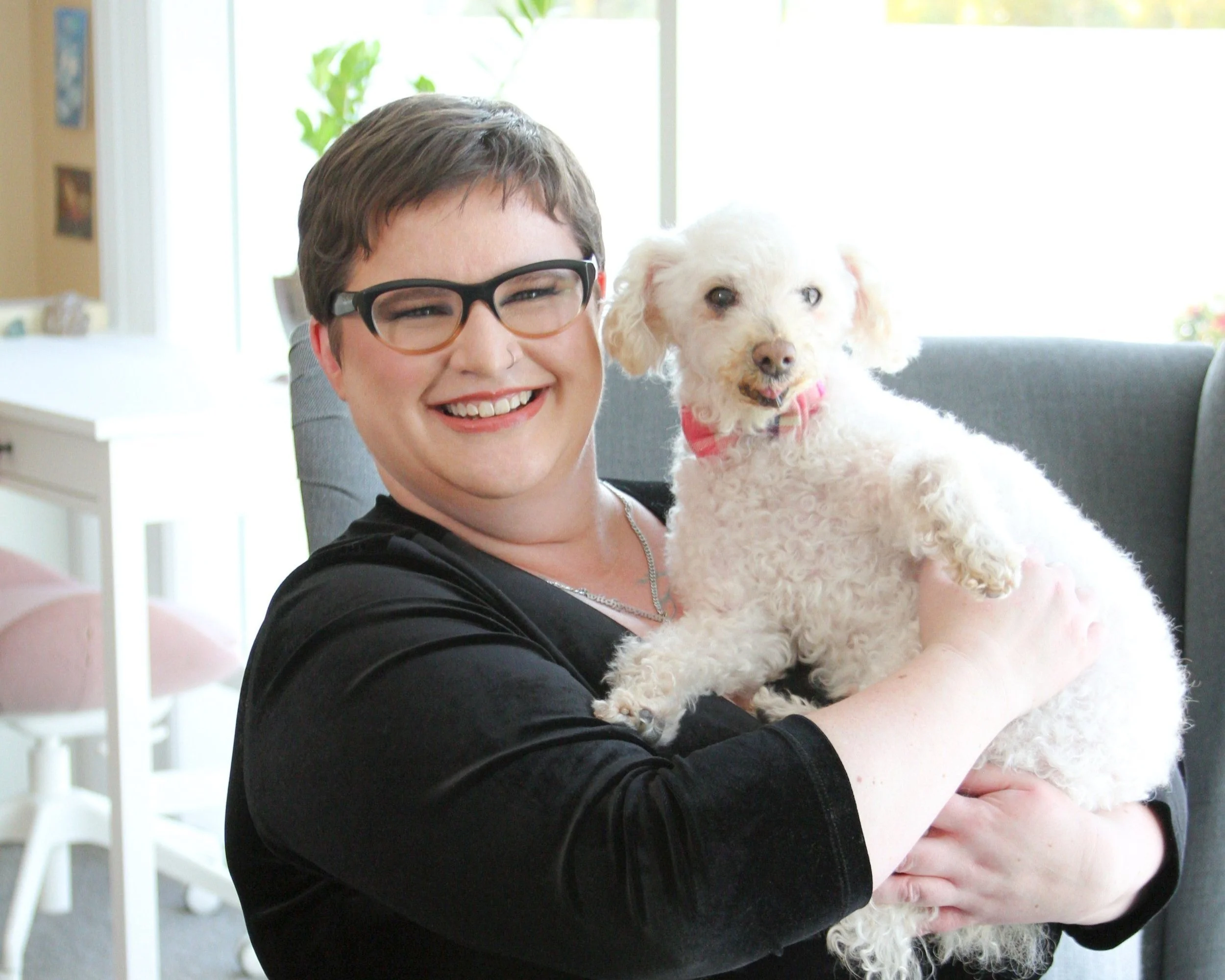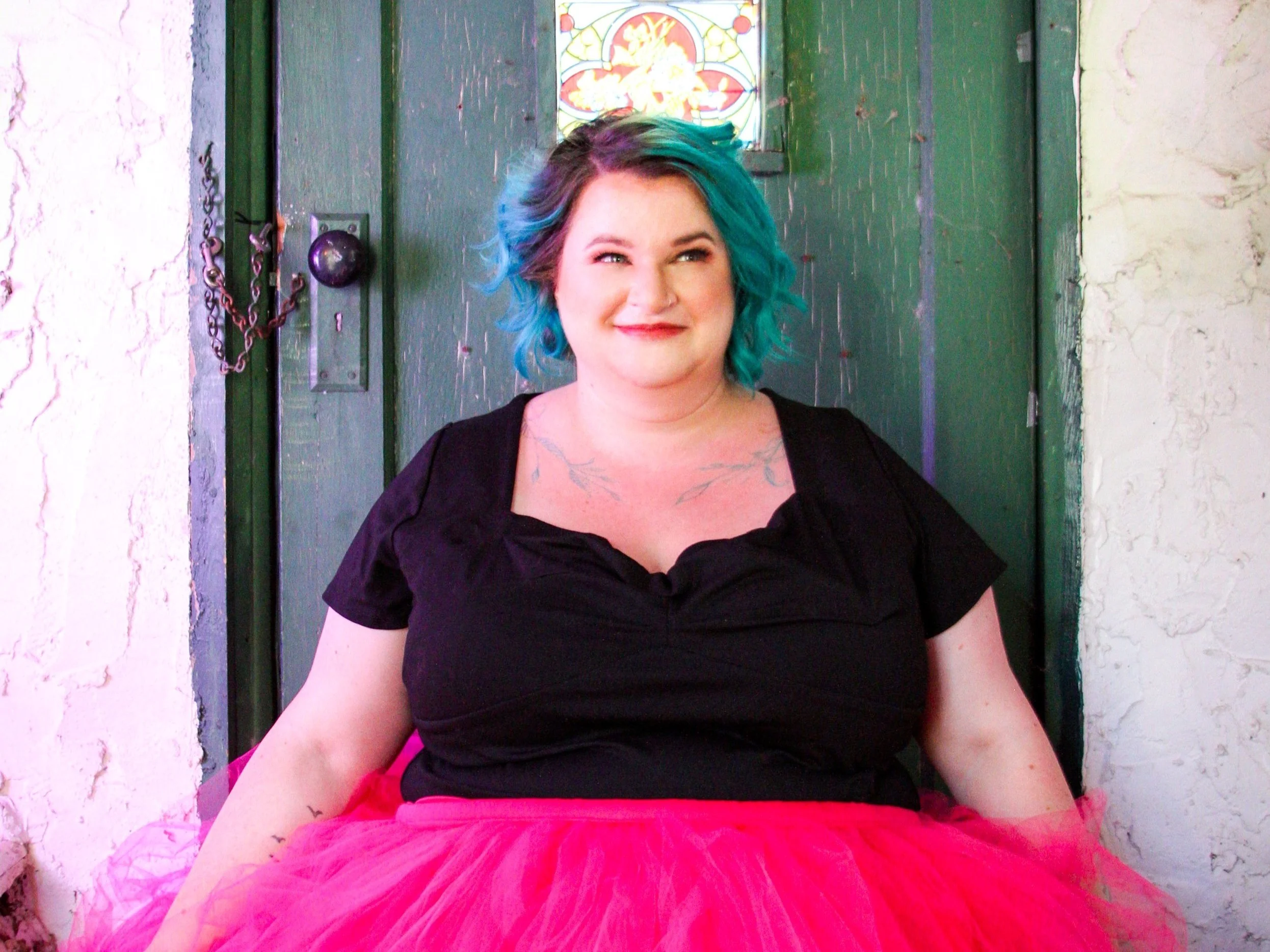Radical Genuineness: Healing the Loss of Identity After Trauma
Radical Genuineness: Healing the Loss of Identity After Trauma
Radical genuineness is the value of being real or true to oneself through and through. You’re true to yourself to the core: how you think about yourself, how you consider yourself, and how you act, speak, and express yourself. Trauma makes this skill challenging for people. When survivors of trauma are stuck in survival mode, whether that’s fight, flight, freeze, or fawn, our brains are constantly thinking of strategies to stay alive and reduce harm, not necessarily on how to relate or express ourselves. Radical genuineness can be a powerful, healing skill that facilitates encountering and expressing ourselves.
Today, we are dissecting the skill of Radical Genuineness! It’s one of my favorite skills to both practice and discuss.
I have a solid personal value around authenticity, feeling connected to myself, and connecting with people dedicated to being their most authentic selves. Radical genuineness is a skill that helps with this!
I think of radical genuineness as saying what you mean as you are.
This is a skill, a principle, or a personal value. To me, it’s connected to authenticity, but it can also be connected to honesty and clear communication.
Radical genuineness is essentially the value of being real or true to oneself through and through. You’re true to yourself to the core: how you think about yourself, how you consider yourself, and how you act, speak, and express yourself.
This practice can be difficult for many people. At the beginning of my recovery journey, it was a challenging concept to grasp, which is part of why I think I’m so fond of this skill and concept.
Not only was it difficult for me, but learning radical genuineness was also reparative for the things creating barriers in my life.
Ultimately, trauma is what makes this skill challenging for people.
When survivors of trauma are stuck in survival mode, whether that’s fight, flight, freeze, or fawn, our brains are constantly thinking of strategies to stay alive and reduce harm, not necessarily on how to relate or express ourselves.
Our brains are hardwired to prioritize survival. Suppose our survival is, at any point, tied to placating, pleasing someone, or masking our feelings. In that case, our brain can be shaped to be sensitive to what others want and expect.
We may mold ourselves to meet those expectations and forgo authenticity because our true feelings might be considered threatening.
This is that fawn response in play.
What causes the fawn trauma response?
The fawn trauma response is caused by experiencing trauma in the context of a relationship. The fawn trauma response is when in order to survive, our brain instinctively acts upon placating the source of the threat. The fawn trauma response is automatic and not consciously chosen just like all the trauma responses.
Fawning is something that many people may have participated in chronically throughout their lives, especially if it came up early in life when their brain is developing and their sense of self is forming. When this happens, the fawn trauma response can be a deeply rooted automatic response to building relationships.
Fawn response in relationships
The fawn response in relationships can become a firm template for how one interacts with themselves and other people. Placating in the fawn response in relationships is when we decide to engage with people from the perspective of reading what people want from us and giving that to them to make it out of that conversation or situation intact.
When we engage in the fawn response in relationships, we are not building authentic relationships or expressing our truest selves. This was necessary for survival during a traumatic experience, but is not needed in our safe relationships. Experiencing complex trauma, chronic trauma, or sexual assault trauma often causes a fawn trauma response and can cause this fawn trauma response to get triggered more easily in our lives.
Some other experiences that causes the fawn trauma response and can make radical genuineness challenging for survivors:
Domestic violence
Intimate partner violence
Sexual abuse, rape, sexual assault
Narcissistic abuse
Family systems where there is a strong push for being in service of others.
Addiction or substance abuse
Sometimes, we get pushed into trying to manage another person or a relationship over being ourselves. Many of these relationships, especially when abuse or trauma occurs, will activate that placating/people-pleasing survival system and the fawn response in relationships. Our minds will then tell us to meet this other person’s expectations and to hide our true self out of interest in making sure this other person is okay.
Keep in mind that these are automatic, instinctual responses. When I say, ”We decide to do this,” it’s more like our brain and instincts are choosing to do this.
We don’t consciously jump into deciding whether to people please or placate. We can, over time, especially as we are becoming safer and safer, start to practice self-observation and mindfulness and notice when urges to people please come up and begin to change that.
Family systems can shape our minds to appease and not necessarily explore the world. So when we are centering placating another person, making sure another person in the family or that relationship is satisfied, these natural developmental processes that we’re supposed to go through (exploring the world, learning from the world, falling and making mistakes, learning about ourselves, learning what we value), we don’t have those experiences.
This lack of development can also complicate radical genuineness because being genuine requires knowing oneself. If we haven’t taken the time to explore those things because we’ve been in a family system that caused us to focus on another person, we may not have done that exploration to have that base of how to be genuine.
How to stop fawning trauma response
Radical genuineness can still be a powerful, reparative skill that facilitates encountering and expressing ourselves and stop the fawning trauma response.
What is it? Radical genuineness is both what we say and how we say it.
When it comes to what we say, we will say self-validating things, expressing our feelings and needs, and reflecting that to people precisely as those feelings and needs exist.
We can validate ourselves by simply saying it’s okay or understandable to feel a certain way.
When we use the word “radical” in radical genuineness, we mean we do this with our entire self: mind, body, heart, and soul. Everything is completely transparent in the moment. Your whole self is being genuine. This is how we stop fawning trauma response.
When we think of accurate expression, we express things exactly as they are. We don’t exaggerate or minimize them.
We don’t shrink our expressions to fly under the radar or ensure everyone feels okay. We don’t exaggerate our expressions to ensure we get the support we need.
We also embrace radical self-acceptance as part of radical genuineness in order to stop fawning trauma response. In radical genuineness, sometimes we admit things we don’t know or have the answer to. If something is difficult, you recognize that and understand you need more time to process your reaction before responding.
When we create space for ourselves to have reactions and responses, to need more time, and not to have the answers, we’re walking a path of radical self-acceptance. We’re allowing ourselves to be human.
This can be a healing experience; we’re showing ourselves the nonjudgmental acceptance we want from others.
How to Become Authentic: Radical Genuineness
How to Become Authentic: Radical Genuineness
How we become authentic is through practicing radical genuineness. When it comes to how we say it, this is how we express ourselves, always speaking transparently. Becoming authentic with radical genuineness means we’re letting the person witness our internal thought, feeling, and sense process, but we’re also allowing them to witness us in real time, experiencing those things.
We become authentic with radical genuineness when we say it exactly how we are, precisely in the manner that arises. When speaking genuinely, we’re using our own language, mannerisms, expressions, and inflections. We use our behavior to communicate what feels right to us at that moment.
This also means that radical genuineness is not a time where we use coded language to express something with a specific tone, jargon, or professional language, but personal and casual language, rather.
We connect in a personal way.
Part of why it is so key to be expressive as we are and how we are is that it allows people to experience us as we are.
This, too, can be hard for people who’ve experienced trauma or who tend towards people pleasing. It can be challenging for survivors to understand within themselves how to express something genuinely.
It takes practice to become authentic with radical genuineness. Radical genuineness is not a target or a goal; it is a practice we continue to build over time.
Mindfulness and Radical Genuineness
Mindfulness is a significant component of radical genuineness. We must be mindful of ourselves in order to know what is transparent and genuine within us.
We have to practice the art of self-observation by observing our thoughts, body sensations, and action urges and putting words to them. The more we practice observing ourselves, the more we can share that with others.
Levels of Validation and Radical Genuineness
Radical genuineness is one of the 6 levels of validation and is ultimately an act of true validation. Radical genuineness s the 6th level in the 6 levels of validation, the highest level of validation. When we show up as ourselves, we validate ourselves by allowing our whole selves to be there. Declaring ourselves as we are and inherently accepting it without judgment is profoundly healing.
Radical genuineness also validates other people. When we show up for other people as our full, authentic selves, we invite them to show up as their full, authentic selves.
It communicates to people that they exist and they matter.
Setting Healthy Boundaries in Relationships
It’s important to set healthy boundaries in relationships and radical genuineness helps setting healthy boundaries. Radical genuineness is not the same thing as having no boundaries. It is not the same as telling people what’s going on with you at all times without keeping anything private.
Boundaries are also genuine.
Setting healthy boundaries in relationships and disclosing information to people when it feels in line with your trust with them and appropriate to the relationship is genuineness. When someone asks for information you don't want to give them, saying something along the lines of, “I’m not comfortable sharing that with you yet,” is practicing genuineness.
You only disclose information about yourself to the degree of trust and vulnerability you have with a person.
How To Be More Genuine
How To Be More Genuine
Radical genuineness is how to be more genuine! Radical genuineness might take a lot of practice to master. I still work on it today. It took a reparative process for me to land in it and feel comfortable with it.
How to be more genuine for me started with slowly contending with my fears around being authentic with people, my urges to placate or give people what they’re looking for, and connect with my value of wanting to be seen and have relationships that accept me as I am.
One of the things that I noticed for myself was that in all of these relationships I was cultivating, where I was being mindful of what other people wanted and expected, it felt incredibly lonely.
With the fawn trauma response, people weren’t seeing me as I was, and I wasn’t sharing who I indeed was. I wasn’t getting social support and felt lonely in those relationships. I would feel exhausted after spending time with those people because I spent the whole time performing.
Over time, practicing radical genuineness meant contending with the fear of what would happen if I was genuine with people, the fear that people would judge me, I would lose relationships, I would be hurtful to people, or people wouldn’t be able to tolerate me being open and honest with them.
This fear that the beauty of me being my fullest self would be stolen if I were to show those parts to other people and they didn’t appreciate it always lingered.
It reminds me of a Stephen King quote that always rang true for me:
“The most important things are the hardest things to say. They are the things you get ashamed of because words diminish your feelings - words shrink things that seem timeless when they are in your head to no more than living size when they are brought out. But it’s more than that, isn’t it? The most important things lie too close to wherever our secret heart is buried, like landmarks to a treasure our enemies would like to steal away. And you may make revelations that cost you dearly only to have people look at you in a funny way, not understanding what you said at all or why you thought it was so important that you almost cried while you were saying it. That’s the worst, I think. When the secret stays locked in not for want of a teller, but for want of an understanding ear.”
Wanting to share these vulnerable things and my truth with people would diminish how I understand myself because they become real and living-sized outside of me.
When something becomes real, it now exists where other people witness it and will react to it.
How is their reaction and response going to affect me? How will it change or shape what I share with people?
Over time, I learned that this thing becoming real still exists in its limitless place within me. Sharing it with other people doesn’t threaten that limitless place. And, if I’m in a relationship with someone who actively diminishes these things I bring out from within me, it’s a great indicator that this relationship is not for me.
I know how to be genuine is easier said than done. Losing relationships and being left alone is terrifying, and we would rather be with people who don’t know us or see us than be alone.
The more I practiced radical genuineness, the more I could create relationships with people who saw me as I was and encouraged me to allow them to be limitless within me. It’s been such a healing experience to have.
We don’t get to meet those people unless we’re being totally genuine with everyone in our lives.
Radical genuineness can sometimes feel awkward and clumsy, especially when we’re used to people pleasing or being guarded. It can feel like we’re saying one thing, and then we must stop and restate it. We can speak to that awkwardness in a way that’s also radically genuine, that shares our humanity with people.
Radical genuineness is ultimately foundational to self-compassion and self-acceptance. It opens us up to change.
When we’re radically genuine and share our thoughts and feelings, we get to learn and grow because we get feedback. Feedback can be scary as it may mean being open to criticism, rejection, or mistakes, but that helps us grow and expand. So many survivors hold the value of continuing to evolve, and this helps with that.
The more we witness and express ourselves, the more we invite acceptance, and compassion will come naturally from that.
I hope this inspires some ideas on practicing genuineness within yourself and with your close relationships.
Ready to start trauma focused therapy today? Sign up to work with me here. I offer trauma therapy with multiple approaches to best meet the needs of trauma survivors. Read more about working with me here.
You can also try out my online group offers: Trauma Coping Skills Workshop and Group Therapy for Trauma to connect with a supportive community and learn helpful trauma coping skills from home.
Want to learn more about YOUR survivor archetype? Take the QUIZ and get unique skills specific to you!
You can sign up for my newsletter to get tips for trauma recovery right to your mailbox. You can also listen to my podcast, Initiated Survivor, anywhere you hear podcasts. Follow me on Instagram, TikTok, Facebook, and Youtube to get awesome survivor content.






